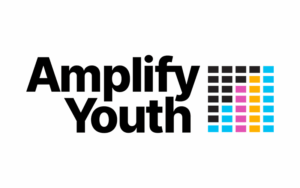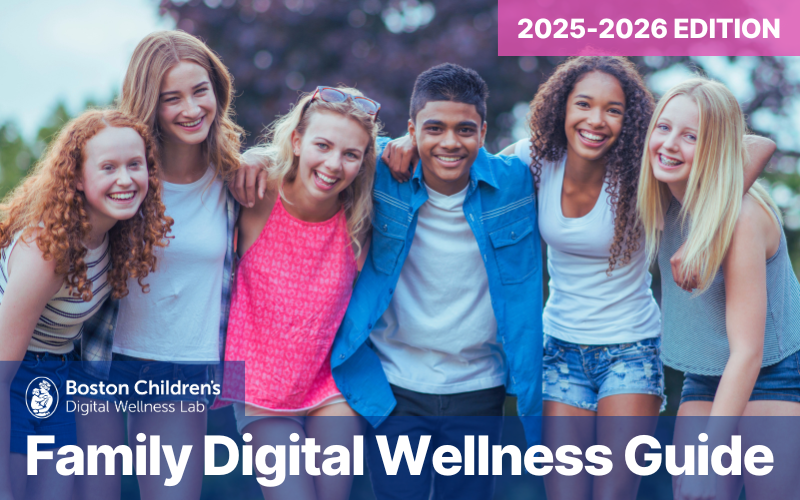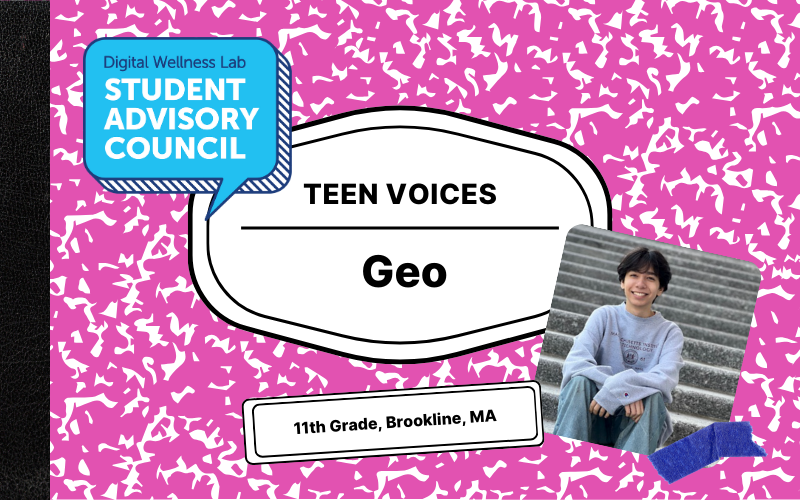Geo, a member of our 2023-24 Student Advisory Council, shares that when it comes to digital wellbeing and technology, the adult view that the absence of devices is optimal, is unidimensional and unrealistic for today’s youth.
What does a “day in the life” look like for you with using technology and digital media?
Since grade school, I’ve been told that junior year of high school is two things: the most important and the most stressful. Now, as a junior, I know that to be true; my life revolves around academics and, consequently, so does my technology and digital media use. In the mornings, I use my iPhone’s Clock app to wake up early for school and my plethora of Spotify playlists to enjoy the train ride there. At school, I’m always using Canvas (my high school’s online dashboard for classes), my meticulously color-coded Google Drive, AP Classroom, and the myriad of other miscellaneous academic apps and websites to ensure I’m kept up-to-date with assignments and important documents. Homework-wise, I always download PDF documents of textbooks and readings for class so all of my resources are comprehensively stored on one device, and nowadays, most assignments have been integrated online; for some classes, I don’t even carry around a binder or notebook. As I navigate through junior year, the incorporation of technology into my academic routine has become more than just a convenience; it’s now an essential part of my academic life. Each notification, click, and download contributes significantly to my education—a truth commonplace in modern-day high school experiences and completely unlike those from twenty years ago.
What are your favorite platforms/apps and why?
My favorite platform right now is Instagram. I love the way Instagram allows me to interact more with peers whom I don’t necessarily get to talk to in-person, and connect further with people I do. It feels like such a futuristic concept to have a digital portfolio of sorts to hold memories and old friends, especially one that is everlasting, like a perpetually updated time capsule
What are the greatest opportunities you see for teens when it comes to using technology?
The opportunities of digital technology for teenagers are virtually endless, so I will focus on one example: education. Digital technology has streamlined the efficiency of studying and learning — older learning tools like flashcards, notebooks, textbooks and lectures have been replaced by Quizlet, iPads, PDFs and video-based lessons. These tools not only bring teenagers an easier and, in some cases, cheaper way to learn; they also make knowledge endure much longer, as Quizlet flashcards and iPad notes are stored on tiny, seemingly immortal chips, as opposed to the countless shelves of textbooks and the evanescent existence of in-person lectures. Plus, teenagers now have billions of gigabytes of information at our virtual fingertips, and can be immersed in our interests to a greater extent than in the past. With the internet and the tools that come with it, I am certain that our generation possesses the opportunity to achieve higher levels of knowledge than ever before.
“The ability to decide whether or not to believe the content which is spoon-fed to us is not instinctive or innate; it is learned by experience, and, since short-form video content and social media are so new, many teens have not had the opportunity to have those experiences.”
What are the greatest challenges you see for teens when it comes to using technology?
As a former TikTok addict, I have seen far too many teenagers on the app influenced by disinformation and purposefully-inflammatory content. Many of our teenage brains are not fully wired yet to distinguish propaganda from news, fact from opinion, even AI-generated images from real ones. Not only can being susceptible to these falsehoods place us in potentially dangerous communities and inflict us with potentially dangerous beliefs; they can also lead to mental health problems. For example, pro-eating-disorder (pro-ED) content is often disguised as professional health advice, and leads to eating disorders in countless teenagers, especially because of some teenagers’ underlying mental vulnerability and negative self-image. The ability to decide whether or not to believe the content which is spoon-fed to us is not instinctive or innate; it is learned by experience, and, since short-form video content and social media are so new, many teens have not had the opportunity to have those experiences.
What are the greatest opportunities you have and challenges you personally face when it comes to managing your technology use?
For years after the pandemic, I struggled with an addiction to TikTok. Originally meaning to escape from Covid’s grasp of the world around me, I nonchalantly tapped the app’s “Install” button, unbeknownst to the fact that the trajectory of my existence as a teenager and high school student would change completely. TikTok grabbed my life and shook it, and suddenly, scrolling was really the only thing I did, and it became tremendously difficult to quit. But soon, years passed and my mind grew, and I became less and less dependent on TikTok. Now, I still use TikTok, but I use it positively; I watch and interact with videos about my hobbies, interests, and real life. Short-form video apps, I know now, are like a choose-your-own-adventure. Their effect on my life is tailored to how I let them affect it, so self-awareness is crucial to create a healthy experience using them.
“I wish social media companies publicized their algorithms and spread awareness to the chance of addiction so that teenagers become more cognizant of the underlying factors affecting their app usage.”
What would you want to see changed or redesigned for technology and/or media to be healthier for teens?
Many algorithms, especially those of short-form video social media apps, are engineered to maximize two things: user retention and time spent watching or scrolling. This, I believe, is one of the primary reasons why teenagers get so hooked into these apps; the apps spew content that is perfect for them, so it gets harder and harder to stop. I wish social media companies publicized their algorithms and spread awareness to the chance of addiction so that teenagers become more cognizant of the underlying factors affecting their app usage.
What, if anything, do you think parents and caregivers are missing when it comes to understanding how teens use media?
I think parents often don’t understand the vast communities their children become a part of online, the lifelong, worldwide friendships able to be forged simply via social media and texting. Relationships have become increasingly dependent on virtual communication, which is something that most parents did not have growing up. When parents confiscate their child’s devices or delete social media accounts, they could be unknowingly removing the child’s ability to contact their closest friends, whether those friends live across the street or across the country.
What guidance or advice do you have for parents and other caregivers to help teens to build and maintain healthy behaviors around digital media and technology?
The view of parents when it comes to digital wellbeing and technology is largely that the absence of devices is optimal — if they grew up without digital technology and survived, then Gen-Z can too. This perspective, to me, is unidimensional. My advice to parents is to be open to healthy experimentation with the offerings of modern digital technology, because, as our world moves further and further into the digital realm, these devices and apps become necessary for teenagers’ day-to-day lives, and having foundational digital experience will make future usage safer.
Geo is a member of the Digital Wellness Lab’s 2023-24 Student Advisory Council. He is a high school junior in Brookline, Massachusetts.
Here at the Lab, we welcome different viewpoints and perspectives. However, the opinions and ideas expressed here do not necessarily represent the views, research, or recommendations of the Digital Wellness Lab, Boston Children’s Hospital, or affiliates.








